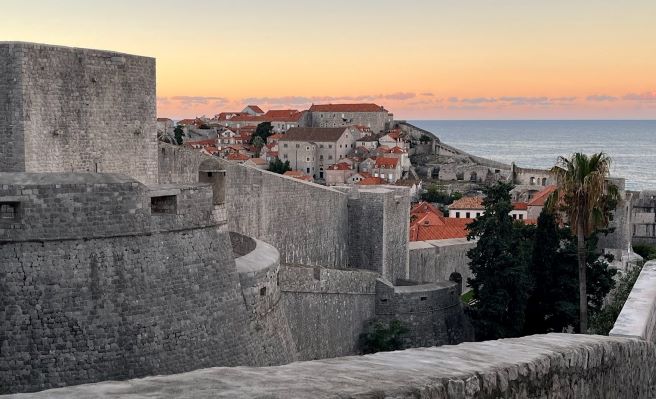
01 Nov Europe: A Comparison
Fittingly, with Election Day coming soon, today we will talk about differences and similarities. However, this will be in the context of Europe, where your blogger recently attempted to set a world record for croissants eaten in one month.*
*Not to mention thin pizza, currywurst, risotto, and even what Montenegrins call “goulash.”
Visiting 26 countries in an area running counterclockwise roughly from Germany to France to Greece to Poland provided an overview—albeit a whirlwind one—that educated us regarding how America and Europe compare politically and otherwise.
Political Differences and Similarities
Generally speaking, European governments appear to provide excellent infrastructure and services, but their citizens have to pay dearly for those privileges. The highways, bridges, train lines, and even cell coverage we experienced were excellent. Retirees seemed to be living comfortably, and visible poverty was minimal. Of course, taxes are much higher in Europe than in America. Those taxes, along with tolls, fees (for example, many public toilets cost a dollar or so to use), and other assessments must be what is paying for all of the nice infrastructure and services.
Another difference relates to internationalism. The 20 European Union member countries we visited basically have no borders between them. Even in non-EU countries like Albania and Northern Macedonia, it was fairly easy to clear passport control and customs checks. Only in Ukraine was it (understandably) time-consuming to enter from Slovakia and exit back into the EU, which took five hours in total. Moreover, the Euro, unlike the U.S. dollar, was accepted nearly everywhere within and outside the EU itself.
Wars. This is one area in which America clearly has had it better than Europe. From Normandy to Poland and Belgium to Kosovo, we toured battlefields, concentration camps, ruins, and even gas chambers that reflected nationalistic hatred, power struggles, and major wars between Europeans. Today’s Ukraine is far from the only country on the continent to be devasted by armed conflicts in the last several decades. Tens of millions of European soldiers and civilians have been killed in war. Even in both World Wars and the Cold War, it was the United States, rather than our European allies themselves, who made victory possible. The American Cemetery near Omaha Beach, along with a Battle of the Bulge tour, demonstrated that point most vividly.
Believe it or not, national politics are more stable in the United States than in many European countries. While this blogger was abroad, Great Britain—a country we did not see on this trip—named a new prime minister, Liz Truss, to replace Boris Johnson, who had been forced to resign. Now, Rishi Sunak will be moving into 10 Downing Street instead, as Ms. Truss lasted only 45 days in office. During the same month, Italy installed Giorgia Meloni as its seventh prime minister in the last ten years. And these are some of the largest, longest-standing governments within Europe; many others are equally unstable.
According to post-trip research, democracy, which America has been trying to spread throughout Europe and the rest of the world for more than two centuries, actually may be declining in Serbia, the Czech Republic, Slovenia, and Poland, with Albania, Montenegro, and Bosnia-Herzegovina said to be only partially democracies today. Query whether this is similar to or different from the good old U.S. of A.
Beyond Politics
We saw prolific examples of religious history in countries like Greece, the Netherlands, and elsewhere, but very little evidence of actual religious faith in the present day.
History and tradition indeed are well preserved throughout Europe. Museums, statues, towers, monuments, and millennia-old buildings are everywhere, which is really cool.*
*Pictured above, for instance, is the Old City of Dubrovnik, Croatia.
Not to put too fine of a point on it, but, speaking here once again broadly, Europeans are not as obese as Americans. Health and wellness appeared to be very good there, other than that we did observe a lot of smoking.
The mood of the people we met and saw seemed to be better than in America, where a national mental health crisis (perhaps exacerbated by our politics) is worsening.
Written by Quentin R. Wittrock, founder of Principle Based Politics.
Look for his posts each week, as this blog will explore and promote the idea of principle in politics, both as to individual elected leaders and our federal government as an institution.


Angela Hermanson
Posted at 19:31h, 17 NovemberGreat observations from a fun trip to Europe!